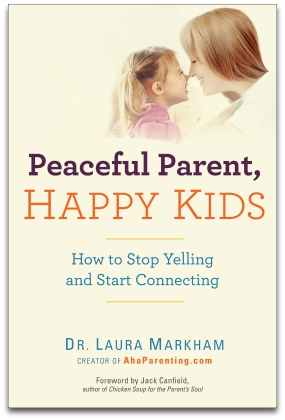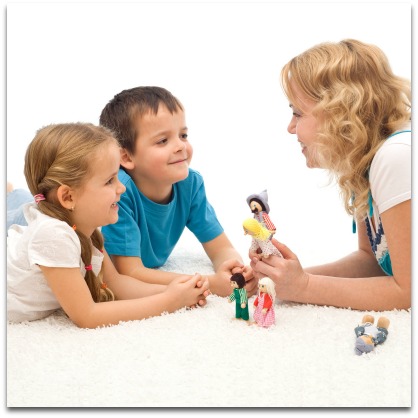 When I see my kids deliberately hurt by someone else the mama bear just comes roaring out in me. No one hurts my babies.
When I see my kids deliberately hurt by someone else the mama bear just comes roaring out in me. No one hurts my babies.
But what do you do if your baby hurts your other baby? How can you make them stop hitting?
The first time I saw this happen, I died a little inside.
I was in the bathroom and heard one of the twins cry out in pain. I ran into the living room, only to find my two year old stomping on his brother’s back.
And I lost it.
I screamed and hollered and removed him from his brother and set him roughly on the couch. The anger I felt towards my two year old – a little boy I loved and cherished – was unfathomable.
The mama bear came out – even against her own.
And I hated it.
That scene repeated itself many times over the next couple of years. My two year old hit. He hit when he was three. He hit when he was four. And when he turned five, he finally quit – he outgrew it, I guess.
But by then the damage had been done.
I was not able to get him to stop hitting in time, and now his twin little brothers had learned to hit – and they usually hit each other.
And guess what? Mama bear was still in there.
Every time one boy hit the other, I lost it. The anger bubbled up and boiled over. No one hurts my babies – not even my own sons.
A few months ago, I quit my part-time job and found myself as a stay-at-home mom. My first order of business: to get them to stop hitting.
I knew how to do it. I just never did it because it takes time.
How many times, as parents, do we know the appropriate tool to use, but don’t even bother, because it takes too much time out of our busy day?
Instead, I consistently told him not to hit, hoping that would be the end of it.
It wasn’t.
 Dr. Laura Markham, author of Peaceful Parents, Happy Kids, explains why, in an article in Psychology Today.
Dr. Laura Markham, author of Peaceful Parents, Happy Kids, explains why, in an article in Psychology Today.
“Instead of helping our child with his feelings…we say sternly ‘No hitting! Hitting hurts!’ and hope that’s the end of it. Except it isn’t the end of it! You can count on him hitting her again, because he still has all those monstrous feelings. They are at war within him. But that doesn’t mean he’s a monster! It means he’s a small child trying to manage feelings that have undone many older humans.”
I felt awful! If only I’d have invested that time years ago, when the two year old was hitting. He needed me to help him manage those monstrous, overwhelming feelings. But I didn’t know how.
If I had, not only would I have stopped his behavior, but he would never have taught the twins how to hit. And I wouldn’t be dealing with their hitting behavior today.
When I finally buckled down and addressed it, it only took two weeks to get them to stop hitting each other.
Two short weeks to correct their behavior. And to keep mama bear hibernating, safely where she belongs.
Why Kids Hit
For children, hitting is a tool they can use to get their needs met and express how they are feeling. And for my boys, hitting became their go-to method of expressing their emotions.
Kids, especially younger kids, usually hit when they feel emotionally overwhelmed. The emotions they are feeling are so strong they lack the verbal capacity to say what they feel.
Dr. Joan Simeo Munson wrote on her blog, Empowering Parents, “Many times kids who display aggressive behaviors simply lack the communication skills necessary to help them through a stressful situation.”
This means kids will hit when they feel anger or frustration. But they also will hit when they are happy, excited, or embarrassed.
So, what’s the key to getting them to stop hitting?
It’s 5 simple tricks that will give your child the ability to express what they are feeling, without hitting.
Trick 1: Listen to Your Children
 And don’t just listen. Also look. Watch for their non-verbal cues that will tell you they are feeling emotionally overwhelmed. My five year old hits – mostly adults – when he is excited or embarrassed. So I watch for cues that he is feeling excited or embarrassed, to ward off any episodes of hitting.
And don’t just listen. Also look. Watch for their non-verbal cues that will tell you they are feeling emotionally overwhelmed. My five year old hits – mostly adults – when he is excited or embarrassed. So I watch for cues that he is feeling excited or embarrassed, to ward off any episodes of hitting.
My twins hit when they are angry or frustrated – usually with each other. So I listen and watch for arguments that may develop into hitting and be ready to intervene before it gets out of hand.
It’s a tricky skill because it’s good to let kids try to work it out themselves before you intervene. The trick is to stop them if you can see that hitting will emerge as their go-to tool and give them another option to solve the problem instead. The more you observe them the easier it will be to forecast when a solid smack is coming.
Trick 2: Help Your Child Identify His Feelings
If your son hits when he is angry or frustrated, approach him when he is angry or frustrated and help him to name his feeling.
“I see you are feeling upset right now.”
“I see you are feeling angry with your brother.”
“I bet you are frustrated because you can’t get that truck hitched up to the trailer.”
If your child gets overwhelmed when he is excited or embarrassed, help him identify that feeling as well.
“I can see you are super excited to go on that field trip today!”
“Your cheeks are pink and you look like you want to hide right now…are you embarrassed about what just happened?”
Trick 3: Help Your Child Verbally Express His Emotion
After he’s named his anger or excitement, help him to explain what he is feeling to you.
Sit quietly while he talks. Try not to put words in his mouth. Ask open-ended questions, rather than questions that can be answered with a yes or a no.
“I see you are upset right now. Can you tell me what’s going on?”
“I bet you are frustrated because you can’t get that truck hitched up to the trailer. Can you tell me what you need?”
“I see you are excited to go on that field trip today! What it is that you are looking forward to?”
“Are you embarrassed about what just happened? Should we go somewhere quiet so you can tell me about it?”
Do not show judgement – what he feels belongs to him and is neither right nor wrong. Be sure to validate his feelings – show him that it is normal and okay to feel what he is feeling.
Trick 4: Give Your Child a Replacement Tool
 Hitting is not an option. If you intervened right when your child was about to hit, or right after he hit, you may need to explain to your child why hitting is against the rules and why he must stop hitting. Ask him to repeat this back to you so that you can be sure he understands. Then give him another tool to try instead.
Hitting is not an option. If you intervened right when your child was about to hit, or right after he hit, you may need to explain to your child why hitting is against the rules and why he must stop hitting. Ask him to repeat this back to you so that you can be sure he understands. Then give him another tool to try instead.
If your child is older and has some reasoning skills you can ask him to come up with something he can try instead of hitting. You’d be surprised at what your child will think up! When he is calm, he can think rationally – and most likely already knows what he could do differently.
“I see you are feeling angry with your brother for taking your ball. I understand why you wanted to hit him, but you know hitting only hurts the people we love. You need your ball back. What would be one thing you could try, to get your ball back?”
If your child is too young to problem-solve on his own, just hand him the correct tool.
“I see you are feeling angry with your brother for taking your car. I bet that made you mad! But you know we can’t hit – it’s against the rules. Let’s try telling your brother that he can have a turn with your car when you are finished with it. Maybe then he will give it back to you and wait for his turn.”
Trick 5: Praise Your Child When You Catch Him Using the Appropriate Tools
It’s a lot of work for us parents to drop whatever is on our plates at that given moment and coach our children through these overwhelming feelings. But it’s even more work for our children! Taming run-away feelings is exhausting. There’s a new skill to learn and old habits to break. We all know how hard that can be!
Be sure to sincerely praise him when you catch him using the appropriate tool.
“Honey, I just saw you ask for your car back rather than hitting your brother! And look! It worked! You have your car and nobody got hurt! Nice job!”
Replacing hitting with the appropriate tool isn’t going to work every single time. Sometimes the other player just does not cooperate. These situations will take more coaching on your part – you will need to coach both brothers as to the appropriate actions that they should be taking.
But in doing so, be sure to first offer words of encouragement to the initiator when he tries, but falls short.
“Oh, honey, I see you tried to ask your brother for your car back. I know he took it from you and won’t give it back to you. Thank you for keeping your hands to yourself! Can I help you talk to your brother?”
Give your kids the words and the tools to express how they are feeling and to get what they need out of the situation, and you should see the hitting dissipate.
But the key is to be consistent. You can’t help them work through it once or twice and think “good enough.” You need to help them through it every single time, until they show the understanding and the ability to use the skill on their own. Once they show some success in stopping themselves you can back off a bit and let them try it on their own.
If they flounder, you are there for support. If they do great, you are there for praise!
The 2-Minute Action Plan for Fine Parents
It’s easier than you think to implement the steps needed to help your kids stop hitting!
Think back to the last time you heard your children fighting. What words were they using? Or not using? How frustrated or angry do they sound? Does it sound like they are able to use their words to work it out?
Think about at what point you intervened. Was it before the hitting started? After? Were you able to quickly help the prospective hitter identify his feelings? What kind of replacement tool from the step above do you think could have helped?
The Ongoing Action Plan for Fine Parents
To really dig in to the issue, start with identifying the triggers for the hitting. Just listen to and observe your child. When does he do most of his hitting? Before dinner? Just after nap? What happened immediately before he hit? What happened immediately after he hit?
Keep a mental or written journal of when your child hits so you can look for patterns. Is it when he is angry? Embarrassed? Feels powerless? Tired? When does your child lose control of his emotions?
Then set him up for success by preventing those situations as much as possible.
For example, make sure he is well-rested if exhaustion causes him to lose control. When he is tired make sure he is supervised when he is playing with his siblings, so that someone can intervene when he feels powerless or angry.
Help him to identify his feelings and teach him how to appropriately express his feelings, both physically and verbally.
Do this with all of his feelings, not just the feelings that trigger the hitting.
It’s going to take time for him to learn a new skill. It will help if you know what triggers the hitting in the first place, and can prevent it from ever happening. When it does happen, you need to act quickly to offer support and guidance by using the steps above.
My son will now turn 4 .I have been receiving complaints recently of him hitting in school .hitting other kids. Also sometimes when he comes home he does complain about some kids hitting him. . Teachers have also said that suddenly out of no blue he ends up hitting.. please advice how to I deal with this
Hi Urvee! That has to be stressful! Is this your son’s first year in preschool? Sometimes a child’s behavior will change as a reaction to new situations or daily routines. I think I would start asking a lot of questions if I were in your situation. Maybe start with a good conversation with his teacher, if you haven’t done so already? I really don’t think kids hit other kids for no reason. Some questions to consider: What happens right before he hits? (Even if it seems totally unrelated, sometimes it’s just good to document things for a bit, to see if there is a pattern…) What happens right after he hits? Does the hitting seem to benefit him at all, in either a positive or negative way? Are the other kids hitting your son in retaliation, or do they hit first? How are your son’s social skills? Is he able to communicate what he needs effectively? Does he seem to get along well with the other children, aside from the hitting? What has the teacher tried, as an intervention for the hitting? I’d also take a look at your home environment; has anything changed there? Is there a difference in routine or schedules? Anyone new in your son’s life? Any big changes going on? Does he hit at home? Have you asked your son why he is hitting at school? I think once you figure out what your son is trying to communicate via hitting other children, then it will be easier to intervene and show him the appropriate way to get his needs met. It’s a lot of work! If you need to talk more, I’m happy to help! You can email me at shannon@makingmommas.com. Good luck!!
Thank you for sharing your feelings! It’s true, “No one hurts my babies”. My son was 4 years old when we welcome to the world his small sister. It was really difficult. He could not understand, why he don’t receive as much attention as he received before. Despite everything that we did, it was not enough for him, he wanted more and more. We had difficult time..
Mcessay thank you for sharing! That is such a difficult time!! It is so heartbreaking, to watch our children struggle with feelings of hurt and rejection. It seems we can never do enough to ease the pain for them. But in the end, everyone has to learn how to handle those feelings and press on. So it is our job to help our children decide what to do with those emotions, not to prevent them from ever feeling them in the first place. So hard to do, because as parents, our first instinct is to keep our children safe and happy. I hope it all worked out for you and your children!
These suggestions are so thoughtful! One thing I had some success with was teaching my son some sign language for different emotions before he could say the words. It didn’t always work, but I agree with you that giving kids the names of their emotions and alternate ways of expressing those emotions are really helpful in eliminating undesired behavior. Now, my son’s telling me stories of kids pushing or hitting each other at daycare and following it up with “that’s not nice!” I don’t know if he always practices what he preaches, but it’s a start!
Alexa I really wish I had used sign language with my kids when they were younger! I have learned so much about the benefits of sign language!! I would have loved to be able to better communicate with my boys at such a young age! There are some great resources out there that teach basic signs for communicating with your babies. 🙂
My son just turned two and he will often walk right up to another child around his size or slightly bigger/smaller and push the child. Afterward he smiles like he is happy with himself. He is my 5th child and the youngest. He doesn’t usually push because he is angry or fighting about a toy. It almost seems to be the way he says “hello” to other kids. He doesn’t usually do it to older kids or adults. And he can talk very well for his age so when he does this i tell him to wave and say hi but not to touch the child. He still does it though. I’m trying to figure out a good way to help him to stop. It’s very startling when he does it to a complete stranger at the park or something and I’m sure the parents think he is a crazy child. Any suggestions?
Hi Jeanne! My son used to do something similar. He would playfully hit when he was embarrassed or wanted to initiate play. I think you are right on in teaching him the appropriate way to say hi. It might just take some time and a lot of reminders. One thing you could try is reviewing the right way to say hi before you enter in to the social situation. You know, just a quick run down of “Okay, when we go in, you wave and say hi, remember? And then we keep our hands to ourselves,” and practice it quick. And then of course praise him for the appropriate behavior, either right there or when you leave.
Any tips for how to address with the child who got hit? My 15 month old son hits my 7 year old stepson or bites usually when they’re fighting over a toy. My 7 year old seems to egg him on. The more the younger one wants a toy, the more the 7 year old wants it and vise versa. When my older one gets hit or bit, I usually try to explain that the baby doesn’t understand that it’s wrong yet and we have to teach him but also that he’s biting or hitting because he doesn’t know how to communicate with us with words yet. This only seems to make my 7 year old feel more frustrated and jealous. What’s a mama/step mom to do?
Hey Sarah, I think you are handling the situation perfectly. It’s great that you are explaining to the seven year old that the 15 month old doesn’t have the words yet to get what he needs. I am betting that the 7 year old can grasp that. But if he is purposefully egging on the 15 month old, it makes me wonder what need of his is being fulfilled by his behavior. Kids have a way of getting their needs met. If you can figure out what purpose his behavior has for him, then you might be able to stop him from egging his brother on and avoid the hitting in the first place.